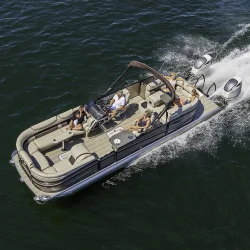Safety tips for recreational boaters
2024-03-29
Safety is paramount for recreational boaters to ensure enjoyable and incident-free experiences on the water. Here are some essential safety tips for recreational boaters:
1. Wear a Life Jacket: Always wear a properly fitting U.S. Coast Guard-approved life jacket while boating. Ensure that life jackets are readily accessible for all passengers, especially children and non-swimmers.
2. Boat Maintenance: Regularly inspect and maintain your boat, including the hull, engine, electrical systems, and safety equipment. Address any mechanical issues promptly to prevent breakdowns or accidents on the water.
3. Check Weather Conditions: Before heading out, check weather forecasts and be aware of potential weather changes throughout the day. Avoid boating in adverse weather conditions such as high winds, thunderstorms, or fog.
4. File a Float Plan: Inform someone ashore about your boating plans, including your destination, route, and expected return time. Provide contact information and update them if your plans change.
5. Follow Navigation Rules: Familiarize yourself with navigation rules, buoys, and markers specific to your boating area. Observe speed limits, maintain a safe distance from other vessels, and yield the right-of-way as required.
6. Avoid Alcohol and Drugs: Operating a boat under the influence of alcohol or drugs is illegal and significantly increases the risk of accidents and injuries on the water. Designate a sober operator or refrain from drinking alcohol while boating.
7. Stay Alert and Avoid Distractions: Remain attentive and vigilant while operating the boat, keeping a lookout for other vessels, swimmers, and navigational hazards. Avoid distractions such as mobile phones or loud music that may impair your ability to navigate safely.
8. Use Proper Lighting: Ensure that your boat is equipped with proper navigation lights for nighttime boating or low visibility conditions. Use a spotlight or flashlight to signal your presence to other vessels if necessary.
9. Stay Clear of Swimmers and Divers: Exercise caution and maintain a safe distance from swimmers, snorkelers, and divers in the water. Watch for dive flags and follow local regulations regarding diving areas.
10. Practice Man Overboard Drills: Be prepared for emergencies by practicing man overboard drills with your passengers. Know how to quickly turn the boat around and deploy rescue equipment to assist a person who has fallen overboard.
11. Carry Essential Safety Equipment: Ensure that your boat is equipped with essential safety equipment, including fire extinguishers, first aid kits, signaling devices (flares, whistles, horns), anchor and line, and a throwable flotation device (e.g., ring buoy or throwable cushion).
12. Take Boating Safety Courses: Consider taking a boating safety course offered by the U.S. Coast Guard or other accredited organizations. These courses cover essential boating knowledge, safety practices, and navigation skills for boaters of all experience levels.
By following these safety tips and practicing responsible boating behavior, recreational boaters can help ensure a safe and enjoyable experience for themselves, their passengers, and others on the water.



